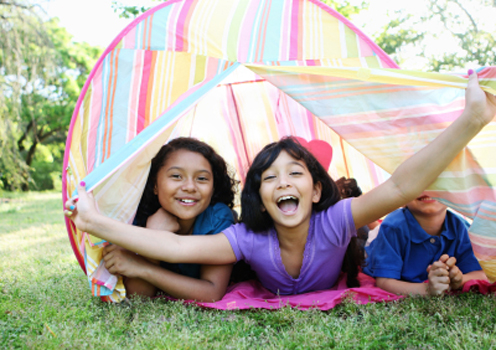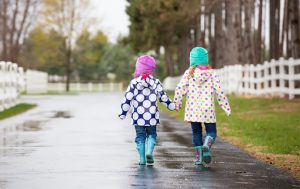The Other Important Thing Kids Learn at Camp

Are you sending your kid to camp this summer? Wow’good on you! I am a big believer in giving kids the overnight camp experience if you can afford it. Your children will leave the comforts of home and learn to rough it. Yes, they’ll learn to start a camp fire in the rain and swim in a cold lake before breakfast. But besides developing grit from being out in Mother Nature, camp allows kids to build their psychological muscle, too. Camp’s other surprising curriculum is helping children learn how to handle life’s ‘social challenges.’
You see, at camp, children are a stripped of their parent’s doting and protection. For example, they’ll be served food they don’t like without the ability to whine for mom to make them their preferred meal. You don’t always get your way at camp, or in life! That’s the ‘iron clad logic of social living,’ as personality theorist, Alfred Adler, would say.
First time campers arrive to a cabin of strangers. Duffel bag in hand, they look around and maybe they don’t see anyone that even remotely looks likes someone they are interested in being friends with. They are smack dab in the centre of life’s reality and feeling uncomfortable about it.
What does your child do when they are faced with a situation that is distasteful to them? Do they call mom to fix things, hoping she’ll right this wrong by getting them moved into a cabin with friends? That reveals a child who thinks ‘other people are responsible for solving my life problems, not me.’ Or do they refuse to stay at camp and demand to come home immediately? That life stance shouts, ‘In this life, it’s my way or the highway! If I can be successful socially, I will evade the challenge all together.’ Do they mope about, bent on proving they won’t have a fun time, and instead have a chip on their shoulder feeling they got the fuzzy end of the lollipop? This approach shows a child who is looking for evidence to prove a belief about life that says, ‘I am a victim of my situation and life is out to get me.’ None of these attitudes are very helpful in life, but they sure are common approaches that people take, starting in early childhood.
Yes, ‘social challenges’ create tension. Their not the kind of tensions you feel when you are being taught how to row a kayak or do the high ropes, but I think parents should embrace them with a similar mindset. With some encouragement, camp can teach your child to learn to handle physical and social challenges.
This is a great time for our children to learn the following life lesson: ‘In life, you can’t always change your situation, but you can always change your attitude about your situation,’ says Dr. Adler. You may not have a say on the cards you’ve been dealt, but you can decide how to play your hand. And that’s empowering. Parents (and counselors) can help teach this important life lesson by sharing that quote with children and discussing it. We can be empathetic to our children and to their struggle, while sharing with the child some suggestions, like: ‘Since you have to be with these cabin mates, you can decide if you want to live with them happily or grumpily. Given you only have a few weeks of camp why not decide to make the best of it instead of feeling down? Sure, it isn’t what you expected, but knowing you, you’ll make the best of a bad situation.’
And do you know what camp miracle happens then? Your child will discover that they can change their attitude, and when they actively look for ways to make the situation better’it works and things do get better. The once-bitter child starts to laugh and open up. As they get to know the others in their cabin and begin to have shared experiences at camp, new friendships flourish. And that is a great life skill to learn at camp.














